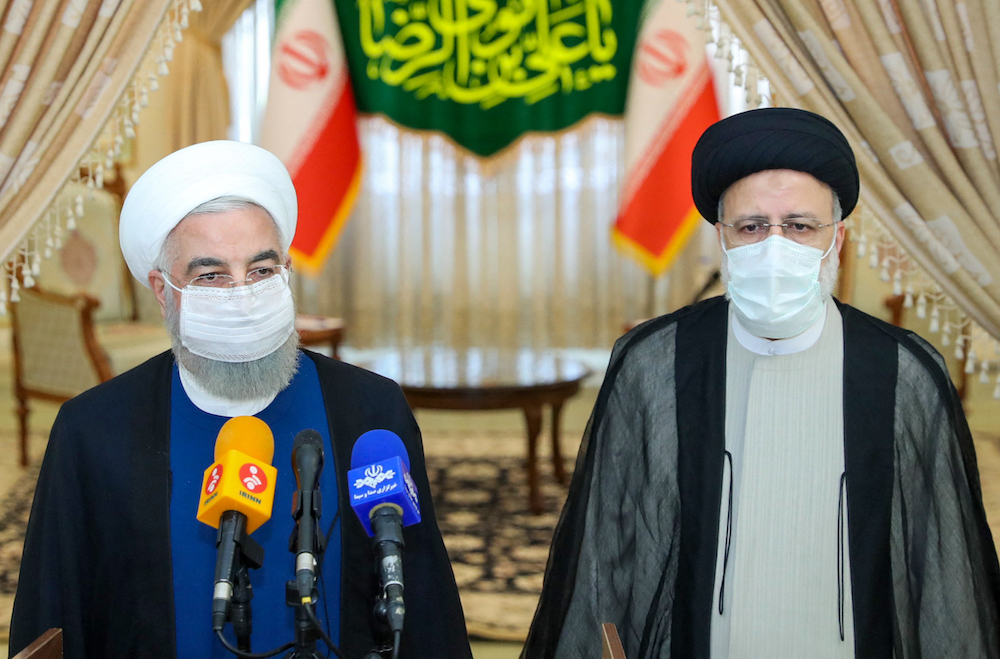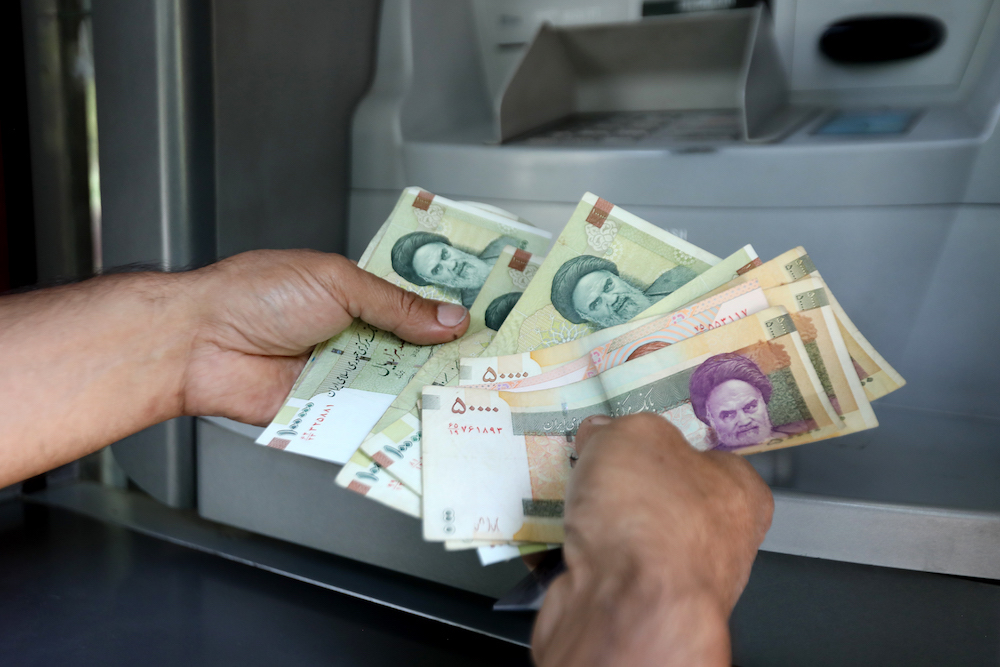LONDON: Few nations have been hit as hard by the global pandemic as Iran. More than 131,000 Iranians have died so far, and parts of the country have been repeatedly forced into lockdowns in an attempt to curb the outbreak.
On top of drought, violence and repression, COVID-19 has turned 2021 into another grim year for the Iranian people.
The inauguration of a new hard-line president has only served to exacerbate their pain. Yet, worse could be on the horizon for Iran’s captive population, experts warn.
The knock-on effects of the outbreak for civil society, rights and freedoms in the Islamic Republic have been severe, and helped to drive the country’s further estrangement from the principles of human rights, respect and liberty, observers say.
Nassim Papayianni, a senior campaigner from Amnesty International’s Iran team, told Arab News: “The authorities’ response to COVID-19 has directly affected the right to health for Iranian people. It has been widely criticized, particularly in relation to a lack of transparency, and the failure to address shortages of vaccines, hospital beds, oxygen supplies and nurses.”

Outgoing President Hassan Rouhani (L) taking in part in a press conference with President-elect Ebrahim Raisi (R) during his visit to congratulate the ultraconservative cleric on winning the presidential election. (AFP/Iranian Presidency)
She said that the crisis in the country was made worse by decisions at the highest level of government.
“Although Iran launched its COVID-19 vaccination program in February, less than 6 percent of the population had been vaccinated by August 2021. This was widely blamed on Supreme Leader Ali Khamenei’s January 2021 decision to ban vaccines produced in the UK and the US,” she said.
While Khamenei later backtracked on that decision and allowed the import of foreign vaccines, the damage was already done. Almost 130,000 Iranians are now dead, and with so few vaccinated, the number is likely to keep climbing.
Papayianni also decries Iran’s treatment of its ethnically Arab population in Khuzestan province, who protested this year against the extraction of water from their state.

Iranians gather during a protest to voice their anger after their province's lifeblood river dried up due to drought and diversion, in the central city of Isfahan, in November. (AFP)
“Iran’s worsening water crisis is depriving people of their right to clean and safe water, and has led to several protests, including in Khuzestan. Environmental researchers say authorities have failed to take adequate action to address the crisis. Rather than address this environmental crisis, the Iranian authorities have targeted environmental activists.”
The August inauguration of President Ebrahim Raisi — an ideological hard-liner chosen by Khamenei and directly implicated in crimes against humanity — only added to the pain of everyday Iranians during 2021.
“That Raisi rose to the presidency instead of being investigated for the crimes against humanity of murder, enforced disappearance and torture is a reminder of the systematic impunity that reigns supreme in Iran,” said Papayianni.
She said that Amnesty International has evidence proving Raisi was directly involved in the “death commissions” that saw thousands of political prisoners summarily executed by the Islamic Republic in 1988.

Iran is one of the world's worst hit countries by the coronavirus pandemic. (AFP)
Raisi “carried out the enforced disappearance and extrajudicial executions of several thousand political dissidents in Evin and Gohardasht prisons, near Tehran, between late July and early September, 1988, Papayianni said.
“Victims’ bodies were mostly buried in unmarked mass graves.”
She said that Amnesty International has called for Raisi to be investigated for the crimes against humanity of murder, enforced disappearance and torture in accordance with international law and standards.
INNUMBERS
* 96 Iranian Kurds arrested since Jan. 6, 2021, by internal security.
* 53 Iranians executed since Dec. 19, 2020, about a third of them Baluchians.
* 6.17m COVID-19 cases since 2020 (as of Dec. 21, 2021).
Referring to the 1988 massacres, Bob Blackman, a UK Conservative Party MP, told Arab News: “The circumstances surrounding the fate of the victims and the whereabouts of their bodies are, to this day, systematically concealed by the Iranian authorities.”
He echoed Amnesty International’s view of Raisi, saying that the former judiciary chief is more akin to a prime suspect than a leader, and should be investigated for crimes against humanity instead of being put in charge of a country.
Blackman, a long-time critic of Iranian human rights abuses, also decries Tehran’s use of kidnapping as a diplomatic tool.
The MP said that he sees no end in sight to the regime’s use of the strategy, and recommends that British citizens with Iranian links stay away from the country for their own safety.

Richard Ratcliffe, husband of Nazanin Zaghari-Ratcliffe, a British-Iranian held in Iran since 2016, sits in a tent outside the Foreign Office in London in October. (AFP)
The case of Nazanin Zaghari-Ratcliffe, a British-Iranian mother-of-one detained in Iran for almost six years on charges of plotting to overthrow the regime, has made headlines in the UK throughout the year, and become emblematic of Tehran’s approach to diplomacy with the West.
“Hostage-taking is a technique associated with the Islamic Republic from the earliest days of its history. At least nine Britons have been held by Iranian authorities since 2013,” said Blackman.
He pointed to British government warnings against travel to Iran, and said: “The dangers that people could potentially face include arbitrary detention, and lack of access to basic human and legal rights.”
The past year has been dismal for freedom of expression, the safety of journalists and access to impartial information in the Islamic Republic.
“The treatment of journalists has deteriorated, with the new ultra-conservative president stifling dissent,” Yeganeh Rezaian, senior Iran researcher at the Committee to Protect Journalists, told Arab News.

The inflation rate in Iran reached 45.2 percent in August 2021, the highest rate in 26 years. (AFP)
“Dwindling resources have forced many journalists to pursue other employment and an increasing number are choosing to flee the country, often at great personal risk, rather than continue to work in Iran.”
She added: “The pandemic has had a profound impact on the information sphere. Multiple journalists have been punished for reporting accurately on the impact of the pandemic. State media, meanwhile, has consistently underreported the devastation, and spread misinformation on vaccines and supposed remedies for the virus.”
Rezaian said that this trend shows no sign of slowing, at least while Raisi remains in power.
“As the former head of Iran’s judiciary, Raisi had a deplorable record of abusing journalists. The courts will likely be further weaponized as a tool of repression on his watch.”
After a year of repression and despair, there appears to be no end in sight for the suffering of the Iranian people — a grim situation manufactured by their own government.



























